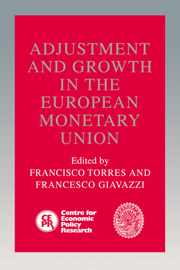Book contents
- Frontmatter
- Contents
- List of figures
- List of tables
- Preface
- List of contributors
- Foreword
- 1 Introduction
- 2 Economic and monetary union: critical notes on the Maastricht Treaty revisions
- Discussion
- 3 The design of optimal fiscal rules for Europe after 1992
- Discussion
- 4 Contracts, credibility and common knowledge: their influence on inflation convergence
- Discussion
- 5 Inflation in fixed exchange regimes: the recent Portuguese experience
- Discussion
- 6 Models of economic integration and localized growth
- Discussion
- 7 Shocking aspects of European monetary integration
- Discussion
- 8 Lessons of Massachusetts for EMU
- Discussion
- 9 Financial and currency integration in the European monetary system: the statistical record
- Discussion
- 10 Currency substitution: from the policy questions to the theory and back
- Discussion
- 11 Coordination of capital income taxes in the economic and monetary union: what needs to be done?
- Discussion
- Index
Discussion
Published online by Cambridge University Press: 29 January 2010
- Frontmatter
- Contents
- List of figures
- List of tables
- Preface
- List of contributors
- Foreword
- 1 Introduction
- 2 Economic and monetary union: critical notes on the Maastricht Treaty revisions
- Discussion
- 3 The design of optimal fiscal rules for Europe after 1992
- Discussion
- 4 Contracts, credibility and common knowledge: their influence on inflation convergence
- Discussion
- 5 Inflation in fixed exchange regimes: the recent Portuguese experience
- Discussion
- 6 Models of economic integration and localized growth
- Discussion
- 7 Shocking aspects of European monetary integration
- Discussion
- 8 Lessons of Massachusetts for EMU
- Discussion
- 9 Financial and currency integration in the European monetary system: the statistical record
- Discussion
- 10 Currency substitution: from the policy questions to the theory and back
- Discussion
- 11 Coordination of capital income taxes in the economic and monetary union: what needs to be done?
- Discussion
- Index
Summary
The chapter by Peter Sorensen provides an admirably clear synthesis of the research on the policy questions surrounding capital income taxation in the presence of international capital mobility, and of some of the problems facing European countries. Like the literature it surveys, the chapter does not take a stand on the welfare effects of alternative regimes of capital income taxation, and therefore it does not answer the biggest question currently facing European countries: what are the efficiency losses of the current regime, and can governments afford to leave it unchanged, despite substantial integration of goods and factor markets?
The purpose of my comments is to highlight the reasons why, in the current state of the art, a reliable answer to this question is not available. Yet I believe that an analysis of the current regime and of its problems does help to evaluate alternative reform proposals. Interest in the field of international taxation began when capital controls were liberalized by a number of industrial and developing countries during the 1980s. This interest is at an all-time high in Europe, as EC countries embark on economic and monetary union. International taxation, however, like other areas of public finance, does not always rest on firm analytical grounds: hence the proliferation of terms like ‘criteria’ and ‘views’.
- Type
- Chapter
- Information
- Adjustment and Growth in the European Monetary Union , pp. 382 - 384Publisher: Cambridge University PressPrint publication year: 1993



